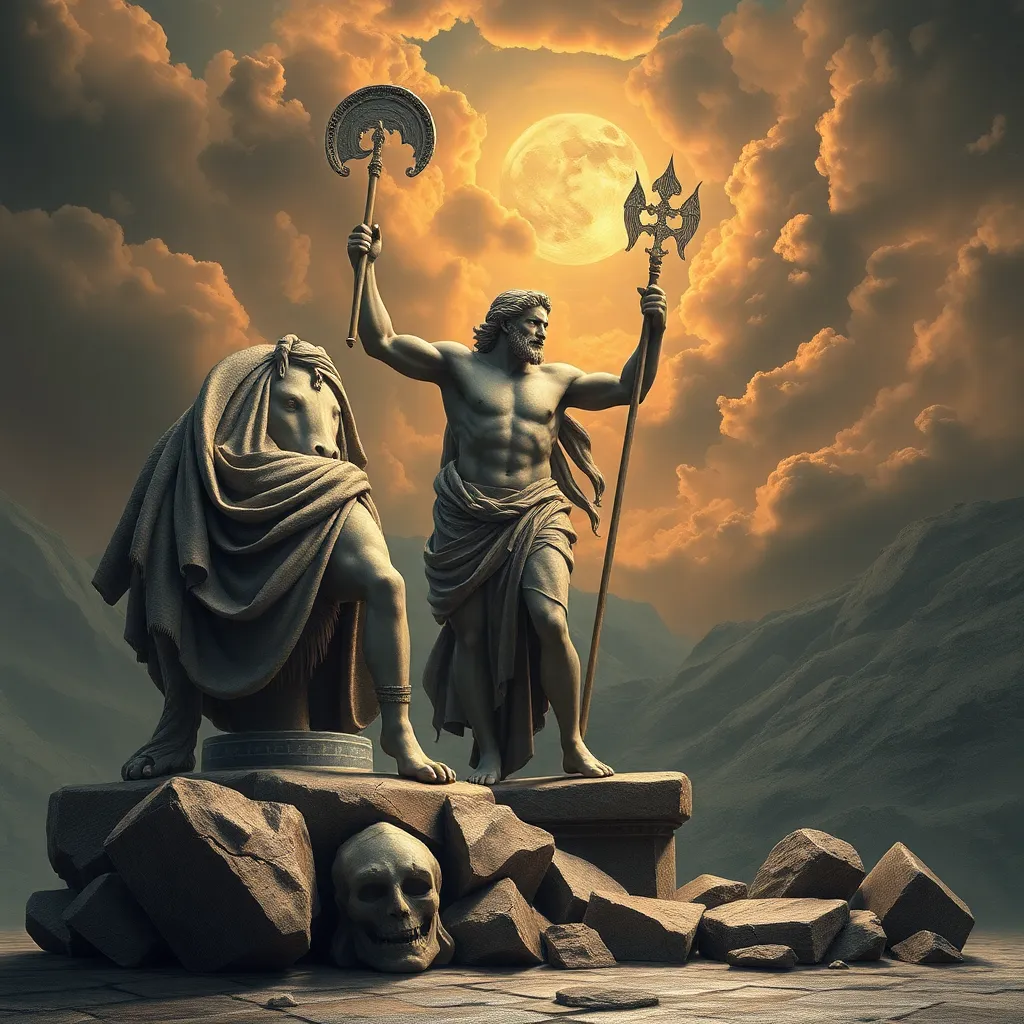The Myth of Perseus: A Reflection of Ancient Greek Society
I. Introduction
The myth of Perseus is one of the most celebrated tales in Greek mythology, detailing the adventures of a young hero who was destined for greatness. Born to the mortal princess Danaë and the god Zeus, Perseus’s life was marked by challenges and triumphs that reflect the values and beliefs of ancient Greek society.
Myths in ancient Greece served as both entertainment and moral instruction, offering insights into the cultural norms and societal structures of the time. They provided explanations for natural phenomena, explored the human condition, and conveyed the virtues admired by the Greeks. This article aims to explore how the myth of Perseus mirrors the societal values and norms of ancient Greece.
II. The Hero Archetype in Greek Mythology
The hero archetype is a fundamental concept in Greek mythology, characterized by traits such as bravery, strength, intelligence, and a quest for glory (kleos). Perseus exemplifies this archetype through his numerous heroic deeds, including the slaying of the Gorgon Medusa and his rescue of Andromeda.
Some key characteristics of Perseus as a hero include:
- Divine parentage, which bestows him with special abilities
- Exceptional bravery in the face of danger
- Resourcefulness and intelligence in overcoming challenges
- A strong sense of duty and honor
When compared to other Greek heroes like Heracles and Theseus, Perseus stands out due to his combination of divine assistance and personal merit. Heracles is often seen as a figure of brute strength, while Theseus embodies cleverness and diplomacy. Perseus balances these traits, achieving his goals with both might and wit.
III. The Role of Fate and Prophecy
Fate plays a central role in Greek mythology, often determining the course of a hero’s life despite their personal choices. The prophecy that foretold Perseus would kill his grandfather, King Acrisius, set the stage for his journey, illustrating the interplay between fate and free will.
This prophecy not only shapes Perseus’s destiny but also reflects societal beliefs about the inevitability of fate. The Greeks often viewed life as a tapestry woven by the Fates, where individual actions could not alter a predetermined outcome. This understanding of destiny and its constraints speaks to the Greek notion of human agency and moral responsibility.
IV. Gender Roles and the Female Archetype
In the myth of Perseus, key female figures such as Danaë and Medusa play significant roles that highlight the complexities of gender dynamics in ancient Greek society. Danaë, as Perseus’s mother, represents the ideal of feminine virtue and purity, while Medusa embodies the fear and power associated with femininity.
The portrayal of women in relation to Perseus’s journey reveals societal views on femininity and masculinity. Danaë is often seen as a passive figure, while Medusa, cursed and transformed, symbolizes the dangers of female power. This duality reflects the cultural expectations placed on women in ancient Greece, where their roles were often defined by their relationships with men.
V. The Significance of Monsters and Adversaries
Monsters in Greek mythology often serve as metaphors for societal fears and challenges. Medusa, a Gorgon with snakes for hair, represents not only physical danger but also the fear of the unknown and the monstrous aspects of the female psyche. Perseus’s confrontation with Medusa can be seen as a symbolic battle against these fears.
Other adversaries in Perseus’s journey, such as the sea monster Cetus, further illustrate the theme of conflict and resolution. These monsters serve as obstacles that the hero must overcome to achieve his goals, emphasizing the heroic ideal of facing adversity head-on.
VI. The Role of Divine Intervention
The influence of the gods is a recurring theme in the myth of Perseus. Gods such as Athena and Hermes play crucial roles in guiding and assisting him throughout his journey. Athena provides Perseus with a reflective shield, allowing him to confront Medusa without being turned to stone, while Hermes offers him winged sandals for swift travel.
This divine intervention reflects the ancient Greek belief in the interconnectedness of humans and the divine. The gods were seen as both protectors and antagonists, influencing the fates of mortals based on their whims and desires. Through these interactions, the myth conveys moral lessons about humility, respect for the divine, and the importance of seeking guidance.
VII. Themes of Honor, Glory, and Heroic Deeds
Kleos, or glory, is a central theme in Greek culture, representing the enduring fame achieved through heroic deeds. Perseus’s quests and victories, such as slaying Medusa and rescuing Andromeda, serve as reflections of the societal values placed on honor and reputation.
These heroic deeds not only elevate Perseus’s status but also ensure his legacy in the annals of mythology. The impact of his actions on his reputation emphasizes the importance of achieving glory in Greek society, where heroes were celebrated for their contributions to the collective narrative of their people.
VIII. Conclusion
The myth of Perseus offers profound insights into ancient Greek society, reflecting its values, beliefs, and cultural norms. Through the exploration of the hero archetype, the role of fate, gender dynamics, divine intervention, and themes of honor, we gain a deeper understanding of the complexities of Greek mythology.
Moreover, the enduring relevance of the myth of Perseus in modern interpretations speaks to the timeless nature of these stories. They continue to resonate with contemporary audiences, highlighting the universal themes of heroism, the struggle against fate, and the quest for identity.
In conclusion, the study of such myths is essential for understanding historical cultures and their reflections on the human experience.




